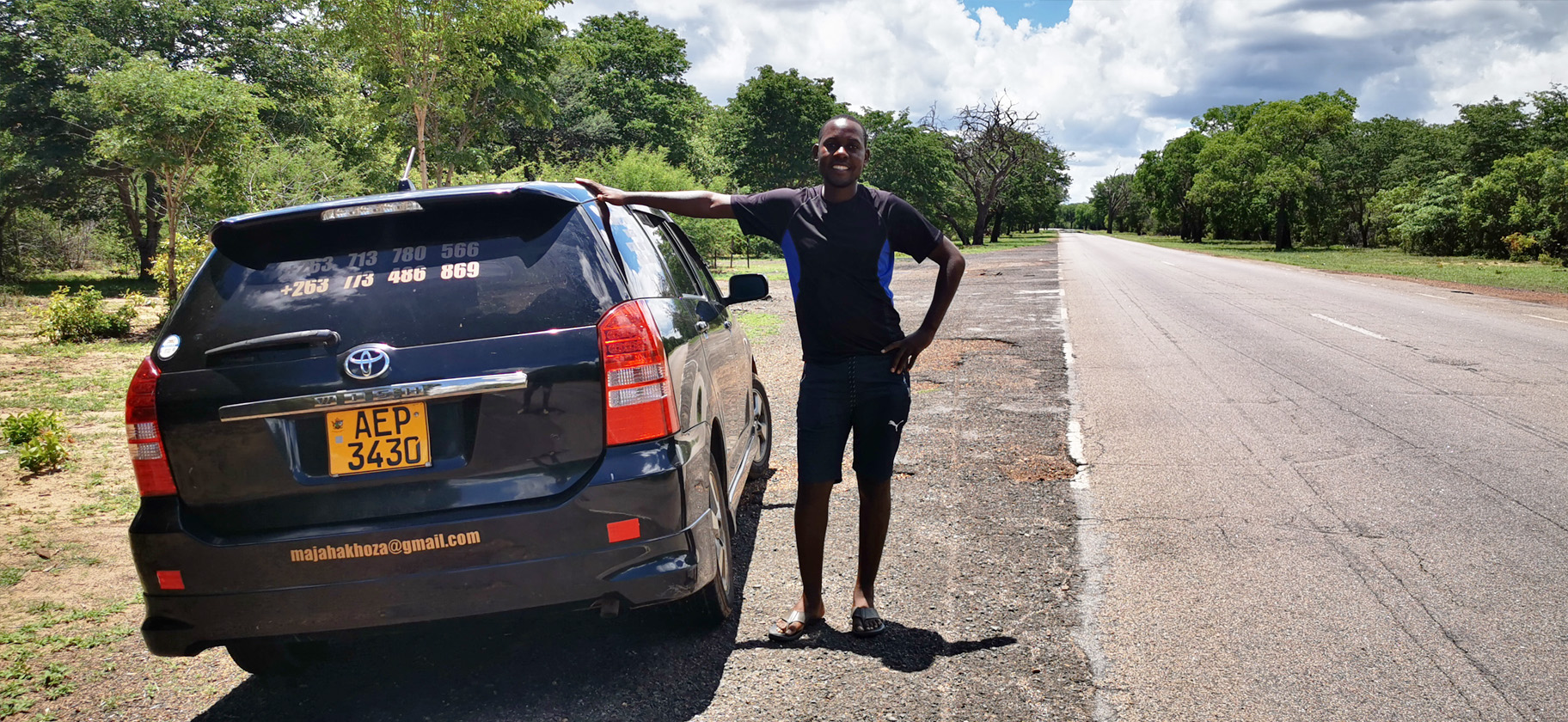The Journey – This is Africa
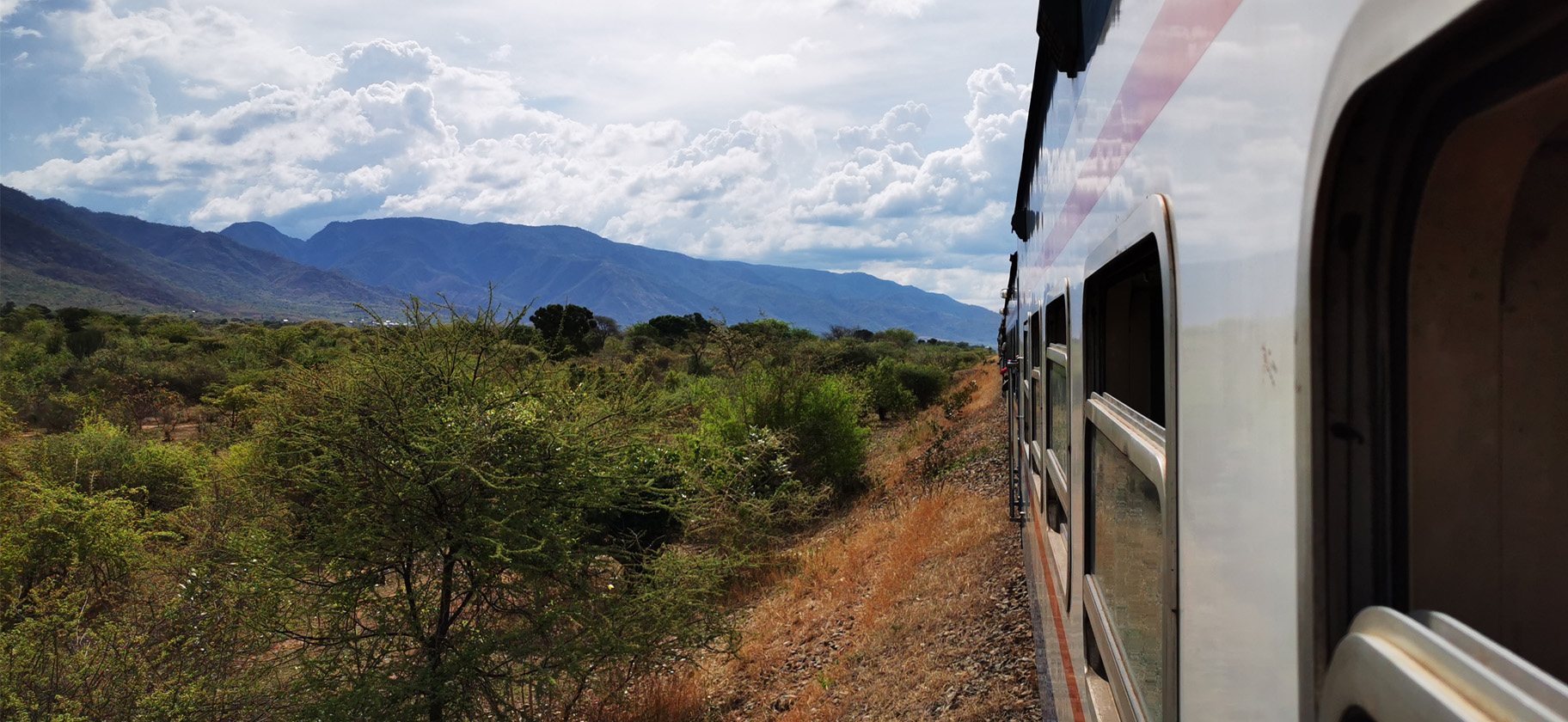
Tanzania
The rumours being spread from the station master were that the train leaving Dar es Salaam was fully booked and that the next available booking was three weeks away. I had prepared numerous contingencies, and upon hearing this news I was fully prepared to, instead, leave Dar es Salaam and head out of Africa to the Middle East, but not before heading to the station to hear the official word for myself. Information on Tanzanian trains is sparse, but all of my research indicated that the Tazara company ran trains from Dar es Salaam to Zambia leaving every Tuesday and Friday afternoon. Like just about every public place in Dar es Salaam, the Tazara station was dusty and overcrowded but I managed to locate the ticketing office and, to my surprise, within seconds I was given a first-class ticket in a sleeper car on the train set to leave in just over an hour. Given the rumours that had been circulating, this was an unexpected turn of events and I was ill-prepared to spend the next 24 hours on a train in Africa. I left the station speed walking through an unfamiliar part of the city and tracked down the last of the things I’d need eventually arriving at the station smelly and drenched in sweat moments before boarding. Every seat in the station waiting area was filled. Large families huddled together and were sprawled across the floor and every woman had a newborn suckling at her breast. Incomprehensible words crackled over the rusty old loudspeaker setting everyone in motion. One woman took pity on me, looking as lost as I was, and called me over to her.
You’re travelling in first-class? she asked.
I think so.
Just stay next to me, sweetie, I’ll get you on the train.
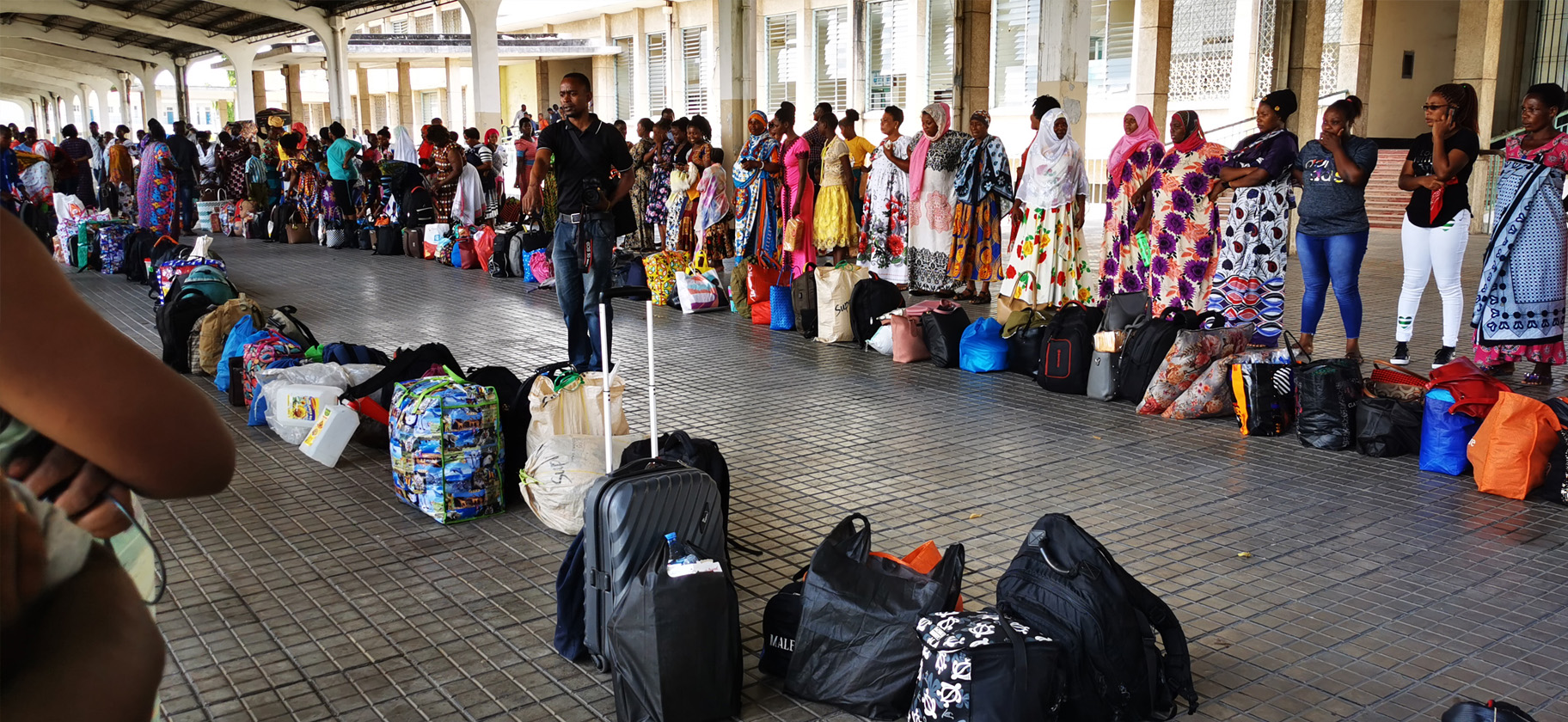 First and second class passengers on one side, a phalanx of third-class passengers down the middle and then security guards motioned us through a series of gates and then formed us into columns, men on one side and women on the other, with our bags placed in rows down the middle. There was an uncomfortable moment of silence before a man yelled out in Swahili and then led a dog, a massive German shepherd, down the column where the bags were placed. Returning to the end of the ranks he called out in Swahili a second time setting everyone in motion again, and turning order into chaos, as a flood of people poured into the train all fighting for their spot. This is Africa.
First and second class passengers on one side, a phalanx of third-class passengers down the middle and then security guards motioned us through a series of gates and then formed us into columns, men on one side and women on the other, with our bags placed in rows down the middle. There was an uncomfortable moment of silence before a man yelled out in Swahili and then led a dog, a massive German shepherd, down the column where the bags were placed. Returning to the end of the ranks he called out in Swahili a second time setting everyone in motion again, and turning order into chaos, as a flood of people poured into the train all fighting for their spot. This is Africa.
The train set out in the early afternoon through the dusty townships on the southern fringes of Dar es Salaam eventually giving way to a vast open countryside of rolling hills covered in African tropical woodland savanna. Temperatures were soaring into the mid-thirties and the fan in the cabin wasn’t working so the only relief that could be had was by popping one’s head out of the window. Men and women ride in separate cabins so I was sharing with a dual Russian-English journalist, named Nicholas, and a Zambian, named Gift, who had travelled up to Dar es Salaam looking for work opportunities. Marin, a recent college graduate from France, noticed the French national team jersey that I was wearing and, at first thinking that I was French, also stopped by our cabin on occasion. Marin was on a bike trip from Kenya through Uganda and Tanzania to South Africa and up the west coast to Morocco. It was a trip he anticipated would take one year and a half and for which he had budgeted $1 a day. He mistook me for younger than I was, but I pointed out the fullness of our respective beards and reminded him jokingly that a beard only gets as full as mine when you reach a certain age. I saw a bit of him in me when I was that young – willing to live on the cheap with nowhere to get to fast – and it reminded me of how much I had changed. He showed me all the new tricks of the travelling trade that millennials were using on their smartphones – apps like Couchsurfing and iOverlander. He had all sorts of crafty tactics and had managed to book his train ticket with Tazara free of charge simply by writing a letter. Refusing to buy bottled water to stay hydrated, he said he would even drink from the local taps at which point I wished him good luck and reminding him that when I was his age I was equally cavalier about ignoring certain safety guidelines – that was until I ended up in a hospital in Egypt with typhoid.
As the train hit the interior, and the sun descended below the line of the hills the temperature became tolerable. Electricity was working in the cabin and it offered the opportunity to set up my laptop to show a movie. Lightning crackled in the night sky and the film was mostly just moving pictures with little being heard over the steady clickity-clack of the train.
The train stops at every village between Dar es Salaam and Mbeya. Many villages have a few concrete buildings and a visible dirt road with a distinctive auburn hue that contrasts with the green of the forests or a wide plot of tilled farmland, but most are nothing but a few thatched huts up in the hills barely visible among the thick foliage. No matter the size of the village, the weekly passing of the train is a big event. Children come running down from the hills waving at the passengers preceded by the village women carrying bushels of bananas, local fried bread, hardboiled eggs, or other fruits on their heads. The train can stop for anywhere from 5 minutes to an hour depending on what kind of people and supplies are being loaded and dropped off.
For the passengers, there is not that much to do but watch the scenery pass by and stare at the clock. By the early afternoon it became clear to me that the train’s adherence to its schedule is not something anyone should take for granted. The 3 pm stated arrival time in Mbeya is an optimistic target based on wishful thinking more than actual experience. What the uninitiated to the African experience also tend not to realize is that nighttime in Africa is dark and loud and where the idea of taking a stroll on a tranquil evening along a well-lit suburban street, like I grew up with in Canada, is a totally foreign concept. Even in some major cities there are no street lights. Homes do not have porches, and electricity is a luxury that is used sparingly, so they just fade away into the forest after the sun sets. The wildness of the continent is all about you at night. Not a day would pass without me discovering some kind of unrecognizable insect, larger than anything I would ever see in Canada, and the noises that these creatures make can be deafening from the stridulating of crickets to the croaking of frogs, the braying of cattle and the coughs and whinnies of beasts unknown. My worst fear was to arrive in a strange place late at night with no accommodation settled, which was becoming the case as the sun was setting and we still had not reached Mbeya. I did some research whenever the network would kick in and my phone could pick up a signal as we passed through a sizeable enough town. I found a lodge that was only a few hundred metres from the station and once the train pulled in I hightailed it out there. After a month in Africa, I had learned that nothing is straightforward and what was supposed to be no more than 500 meters away turned into a 30-minute walk through dirt paths that were barely visible in the oncoming night, but I made it. Feeling like I had no other options, they could have charged me anything they wanted but thankfully this lodge was affordable and finally I could start to settle down.
I did not sleep a wink. Mosquitoes were making their way into the room. I could feel myself dozing off and then suddenly another would fly buzzing into my ear. I would start to doze off again and then there would be a terrible itch on the end of my finger that I would need to scratch. Twenty-four hours soaking in my own sweat on the train followed by a restless night fending off mosquitoes with another 24-hour train ride in my near future, I woke in the morning with one goal which was to pony up for the most comfortable lodgings I could find.
Mbeya was a convenient place to break up the journey, but as a town in its own right there isn’t much to do. There is one main road that runs through it and the city is sandwiched in between hills to the north and south acting more as a transport hub to people hoping to visit Lake Nyasa to the south. Twenty-four hours on the train was uncomfortable enough, and after finding accommodation that could provide the level of comfort to which I had become accustomed, with things like sit-down toilets with toilet paper and a functioning shower, I took the opportunity to organize my work life with the new year approaching. It was a service stop that held little for the visitor other than to lay low and calm and be part of African daily life. In the time I was there I managed to track down the American dollars that I would need to pay for visas along the way and visited a clinic and have a nurse remove a small piece of wood that had lodged itself into the side of my foot and that I just could not reach myself.
When the next train came through town, it was a 12-hour wait at the station because the train gets there when the train gets there. My reservation had been written on a post-it note and I had no other goals for the day especially since I had checked out of my hotel. Patience is a virtue that one develops in Africa should they not already possess much of it when they arrive. I met an Austrian woman headed in the opposite direction, named Ulli, who had travelled all over the world and we kept each other company during the long wait by sharing travel stories.
The sun had set long ago and the Zambian border was a few hundred kilometres away. I had done nothing but sit and wait all day, but I was exhausted. The passengers in my compartment for the journey to Zambia were two burley Poles who had been on the train since Dar es Salaam and were smelling ripe. Money changers boarded the train at Tunduma on the Zambian border. This was the last chance to get rid of any remaining shillings since they would be useless in Zambia. The border guards came onto the train at about 4 am knocking on all of the compartment doors to wake us up. Groggy and tired I fumbled through the various questions I was asked but, by the end, everything was official and the train was on its way again. By morning, we had picked up a fourth passenger in our compartment, a mild-mannered local Zambian in his late thirties named Patrick.
Zambia
Had the train arrived in Mbeya at 2 pm when it was optimistically scheduled, then I might have half expected the train to arrive in New Kapiri Mposhi at 1 pm. Instead, it was looking all too likely that we would be arriving well behind schedule again and most likely in the middle of the night which would mean reliving my worst fear all over again. Unlike Mbeya, however, Kapiri Mposhi was nothing more than a crossroads town, barren of businesses likely to show up on Google maps, and my research did not yield any hotels or other lodgings to speak of. Kapiri Mposhi was the end of the line so at least everyone would be in the same boat and I had daydreams of foreigners banding together and organizing to find a solution. In spite of their odour, my Polish companions were friendly and deep down I thought they would have a plan and we would be able to find strength in numbers. With the evening approaching and Kapiri Mposhi still a long way off I asked one of the Tazara attendants on the train what time he anticipated we would arrive and got the impression that if the train arrived at the station in the middle of the night that we would be able to remain on board and sleep until the morning came which did a lot to ease my anxieties. I dozed off.
I was arrested suddenly from my sleep by a man banging on all of the compartments as he passed through the cars yelling at us to disembark – it was 1 am. I looked at my Polish companions and asked what their plan was. They were headed all the way to Livingstone and presumed to figure out how to get there right there and then in the middle of the night with a shrug of their shoulders and a look of shallow indifference saying simply, we’ll figure something out. I looked over at Patrick, who appeared all at once sympathetic and meek, and asked what his plan was. He mentioned that he was going to a lodge that he had booked so I asked if I could accompany him and he said it would be no problem. We collected our bags and when we left the station there was a driver waiting for us. He drove us directly to a very basic but respectable lodge – the only lodging for visitors that I would encounter in my time there. I was carrying only about the equivalent of $3 worth of kwacha (the local currency) and Patrick kindly paid for my room. He greeted me the next morning prepared to help me with anything I needed. I visited an ATM to get cash and pay him back and he helped me sort out getting a phone card so I could stay connected.
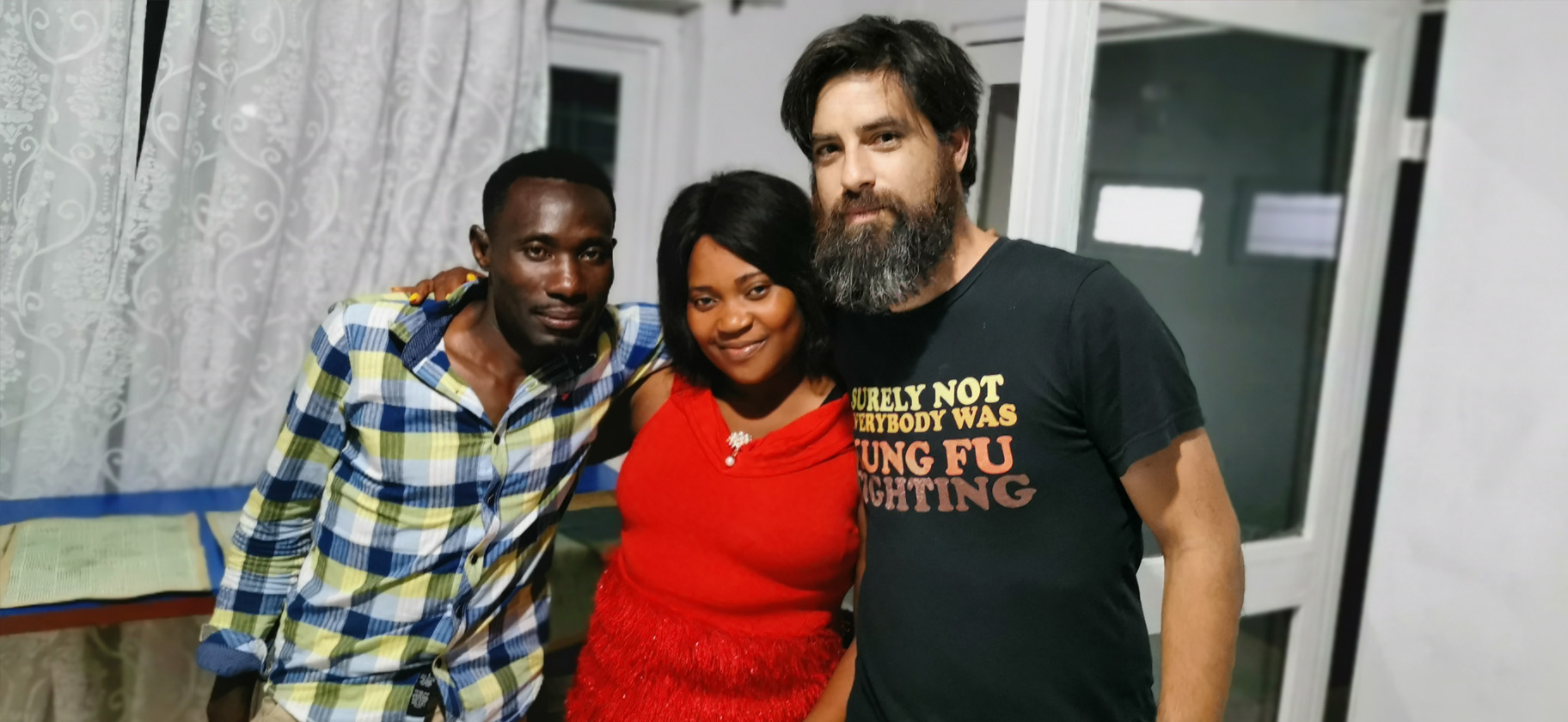
There is not much to do for the visitor in Kapiri Mposhi, but as a way to show my gratitude for his help I decided to stay an extra night so that I could take Patrick and his wife, and his driver, out for supper for T-bone steaks and chips. There is no such thing as fine dining in Kapiri Mposhi and the restaurant at which we ate was nothing more than a small rectangular public building with a small bar. A waitress led us to an adjoining room where they were playing English League matches on a small television. If you live in Kapiri Mposhi and have disposable income you were one of the 3 men stationed at the bar drinking, but dining out, even at a place as seemingly understated by Western standards like where we were, is out of reach for most local residents. The four of us were alone and sat mostly in a calm silence but understanding our respective sense of gratitude. Dinner for four, each of us having the most expensive item on offer, cost me $20.
That day I learned more about Kapiri Mposhi than I think most visitors typically do. It is a place where not a lot really happens. Everything is built mostly on one side of the highway that runs from the Copper Belt in the north to Lusaka further south and there is nothing but one store that sells everything and a few small eateries selling local food. On my journey from Tanzania to Zambia, more than a few people mentioned the difference between the two countries is that one visits Tanzania for the beauty of its landscapes, but one visits Zambia for peace. No one embodied this aspect of Zambia more than Patrick. He didn’t speak much, but he always seemed present and filled with genuine concern. As I walked slowly through the town away from the highway I had time to reflect and for the first time since I had arrived in Africa as the noise of constant demands died away. No one seemed to want anything from me. I thought about all the possible scenarios of arriving so late at night in this place and what could have happened had I not met Patrick that night. In all likelihood I would have emerged unscathed despite having dealt with countless annoyances and living on edge for hours just trying to find an ounce of comfort and peace that I might have had to sleep the day away. As it turned out I got to share steak for the bargain price of a sense of safety and met one of the kindest and quietest souls I have ever had the good pleasure to meet in my entire life. There is kindness everywhere.
The bus park is where all of the action happens in Kapiri Mposhi and the level of chaos one has to endure to navigate it is intimidating. Somehow in all of that mayhem, Patrick managed to find me again so that we could shake hands and say goodbye, and he helped direct me onto a bus destined for Lusaka. The buses in Zambia are used to transport all sorts of things besides passengers, from letters to sacks of maize and household items, and my rucksack got thrown into the cargo hold next to a bag full of chickens so that when I retrieved it at the far end of my trip it was toasty warm and smelling of shit.
Gloria, Sanderson, and Ludovic took pity on me when they saw me wandering aimlessly through the unmarked alleyways of Lusaka. The hotel I was looking for was erroneously marked on the map and was actually located in a suburb called Jesmondine some 10 kilometres out of town along the Great East road. They were eager to help me out, fearful of what could happen to me in Lusaka if I were left on my own, and drove me to the lodge I was looking for but it was fully booked. We tried a handful of lodges in the same area and ran into the same problem every time because Lusaka was the site of an Africa-wide sporting event and the lodges were hosting all of the athletes and sporting delegates from other countries. I kept stressing that they shouldn’t worry too much because I knew that I would be able to make my own way, but Gloria seemed happy enough to tote me around in her car always pointing out that she was glad to help because she was anticipating me one day inviting her to Canada. Two hours went and our search was unable to bear fruit and eventually they brought me back to town with my night’s lodgings still in doubt. I walked into a dozen or so hotels and lodges that day and none seemed able to get me the level of comfort I wanted at the price I wanted and eventually I came to one lodge with the day getting to be so late that I had to decide that enough was enough and just settle in.
One mosquito can ruin a whole night and they were at it once again, but I had also run into another rather sensitive problem. It had been simmering for days if not weeks, but by the time I reached Lusaka it had become unbearable. After so many nights stuck in the heat on a train or in lodgings with inadequate bathing facilities and stewing in my own sweat, often unable to change clothes, it seemed almost inevitable that I should acquire something nasty and the itch in my crotch had reached a level of discomfort that was not going to go away without medication. I was equal parts embarrassed and proud of myself for making what I trusted was an accurate self-diagnosis of my ailment – the all-too accurately descriptive condition known as “jock itch”. I was in desperate need of modern conveniences. My travels of youth had me convinced that I could simply adapt to any discomfort, but I was coming to the realization that I was not a wide-eyed kid anymore. Business makes you soft. A steady income has all sorts of advantages and money solves all sorts of problems, but its poverty that hardens the skin. And by this point, with my skin crawling with fungus, no lodging seemed suitable and I convinced myself to pony up for the Marriott. The 100-dollar price tag seemed outrageous considering the seemingly minor adjustments that would need to be made at some of the 20-dollar places I visited, but I had to tell myself that this is what 100 dollars buys: the guarantee of clean sheets, of fresh towels, of a sit-down toilet that is in the room and not across the complex, of wifi, of electricity that works consistently, of coffee and a kettle in the room, of a clean floor, of a hot-water shower with soap and shampoo, of air conditioning, and of mould-free ceilings and walls.
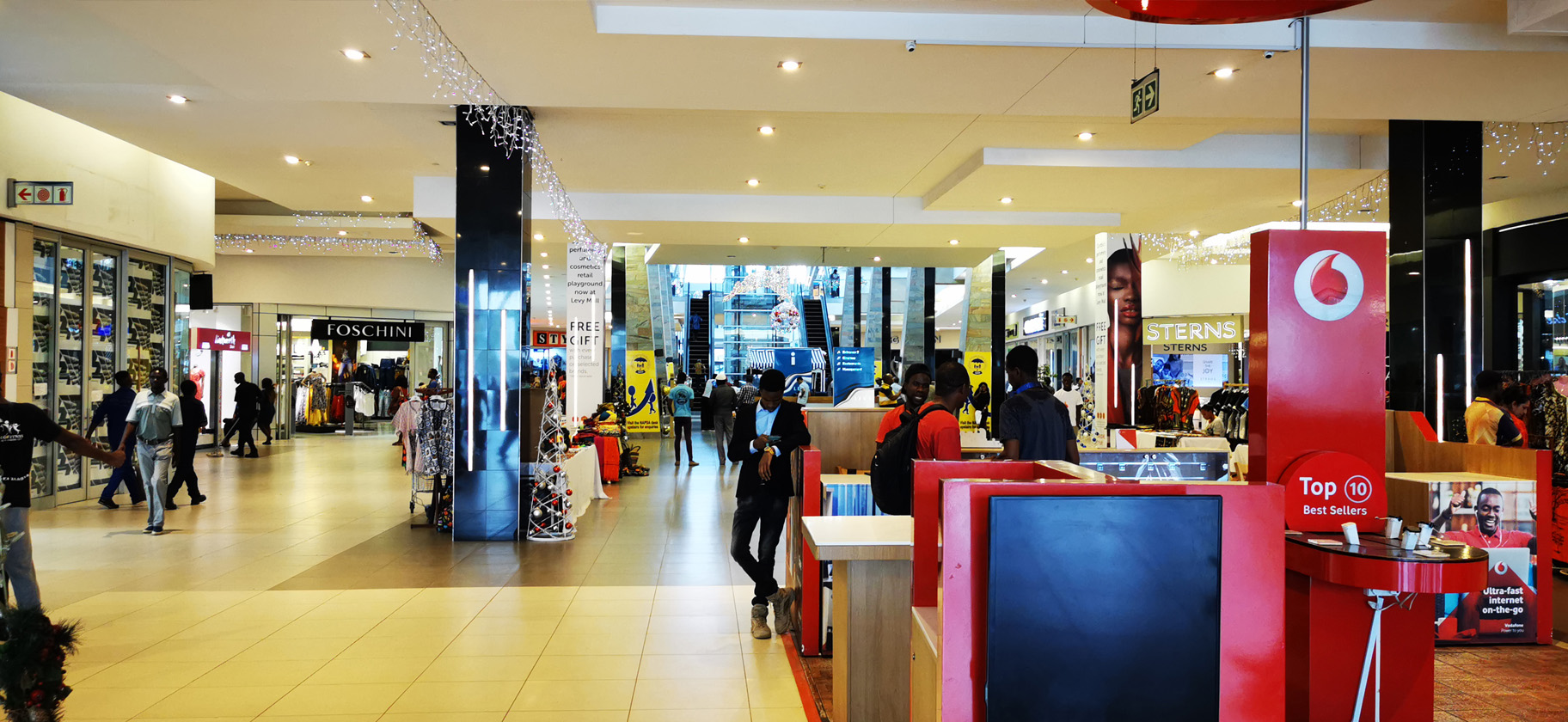 Being in a big city again I now had access to other modern conveniences and, in this regard, Lusaka seemed years ahead of Dar es Salaam. The Levy Park Mall was a modern mall similar to anything you might find in Europe or North America but unlike anything I had seen in the month that I had spent in Tanzania. There were retail clothing shops, escalators, perfume and cosmetics kiosks, modern electronics stores, as well as a modern grocery store with fresh produce and ready-made local food, and a modern cinema. A daily budget was never the kind of thing I ever spend long thinking about on my travels, but with everything at my fingertips now did not seem like the time to be tight-fisted. I woke the next morning refreshed, free of any irritation in my crotch and ready for the bus ride south to Livingstone. The hotel, the ointment, the entertainment, and access to my creature comforts all came together to get me out of my head and focus on the road ahead instead of all the itches and petty annoyances that come from spending so long outside of my comfort zone.
Being in a big city again I now had access to other modern conveniences and, in this regard, Lusaka seemed years ahead of Dar es Salaam. The Levy Park Mall was a modern mall similar to anything you might find in Europe or North America but unlike anything I had seen in the month that I had spent in Tanzania. There were retail clothing shops, escalators, perfume and cosmetics kiosks, modern electronics stores, as well as a modern grocery store with fresh produce and ready-made local food, and a modern cinema. A daily budget was never the kind of thing I ever spend long thinking about on my travels, but with everything at my fingertips now did not seem like the time to be tight-fisted. I woke the next morning refreshed, free of any irritation in my crotch and ready for the bus ride south to Livingstone. The hotel, the ointment, the entertainment, and access to my creature comforts all came together to get me out of my head and focus on the road ahead instead of all the itches and petty annoyances that come from spending so long outside of my comfort zone.
Debra latched onto me as we were waiting for the Shalom bus that runs 3 times daily between Lusaka and Livingstone. She had grown up raised by her mother and her Norwegian quasi-step-father-benefactor who, for many years, had run a Norwegian guesthouse in Livingstone. She had been visiting Lusaka and finishing up her high school equivalency which had gotten derailed when she became pregnant at 13. She helped get me to a lodge in Livingstone and this was when I first noticed things in Africa begin to really break down. She helped check me in because she spoke the local language and pointed out that electricity would not work from about 9 pm until the next day. When she first told me about the electricity issue I laughed because I didn’t really believe her. Livingstone was one of the most tourist-friendly spots in the whole country if not in all of Africa. How could a lodge get away with just not having electricity for half the day? Debra didn’t have any answers at the ready. To her it was normal. Sure enough it was true and the next morning I found myself in total darkness unable to do anything but read a book for my amusement and needing to keep the door to the room open to let in enough light. I went searching for other hotels where the electricity pressure might be mitigated by generators and although this eased the situation, it never solved it. Having left Lusaka, it was now clear that I was descending into an even darker part of the world.
Zimbabwe
When I crossed into Zimbabwe I changed the last of my kwacha into US dollars right at the border not fully realizing that it would be the last time for quite a while that I would see a place where I could get money that could be used to buy things. After purchasing my visa, it meant that I was left with about 120 US dollars. This was all the money I had fetched for myself from banks and ATMs in Mbeya and Kapiri Mposhi and any currency changes I had made along the way. Any foreigner who crosses the border between Livingstone and Victoria Falls is immediately approached by local Zimbabweans hoping to sell billion and trillion-dollar notes of the local currency. At some point, inflation had gotten out of control and devalued the currency and the mint could not keep up. Zimbabwean dollars were effectively useless no matter how many billions or trillions you had. A single US dollar can buy you a trillion-dollar Zimbabwean note from one of the hawkers at the border which is nothing more than a souvenir – its actual value is less than a penny – the literal embodiment of “not worth the paper it is printed on”. When you cross the border, you don’t notice right away that things have changed. Zambia had its challenges and arriving in Victoria Falls with its long history of tourism and big hotels I mistakenly believed that I had left the worst behind me in Livingstone, but I was about to be woken up. I found a decent hotel and a local market where I could get anything I needed and I could just charge it to my credit card and be off. No problem. Life felt normal and first impressions of Zimbabwe were positive. I was keen to do one last small safari and hoping to see rhinos and I also knew that the best way to move on and out of Africa was through Harare, the capital city. Merrilyn had put me in touch with a guide, named Simba, who worked as a guide and had led her through Kruger National Park in South Africa, but who was a native Zimbabwean. By the time I reached Victoria Falls it felt like we had both already sunk countless hours keeping in contact that the pressure to negotiate a deal felt immense though I was beginning to feel that I could get by on my own. It had been arranged that I would meet with his associate, Ndaba, that afternoon at my hotel.
I had spent the whole early part of that day dodging all sorts of shady characters who wanted to sell me everything I had no interest in. The harassment was constant. The locals looked at me like I was a walking ATM offering wood carvings, local banknotes, jewelry, and when I declined they would just straight up ask me for money. At one point, I was walking down the street and chewing on some biltong that I had bought at the local supermarket. When I declined to buy sunglasses from a man he asked me for some of the biltong and I made the mistake of giving him a piece. Other hawkers got word and came running down the road hoping for their own piece and it sent me running off in the other direction hoping to avoid them. By the time I was meeting Ndaba I was worn out and keen to protect my money and make sure that I didn’t get ripped off. Ndaba had a voice that was calm and soothing but the price he quoted me felt steep. I had had these false notions that Africa was a cheap place for travellers and the constant money pressure was beginning to grind on me. Still, he knew the way and could ensure that I had my safari. He could get me all the way to Harare and was willing to be flexible and let me make things up as we went along. There was a lot of pressure to negotiate a deal and I felt I could not let either of us leave that meeting back at square one so we shook hands and got set to leave the next morning. Though it would take a few days to develop, trusting Ndaba was one of the best decisions I have ever made in all of my travels, if not my whole life.
Ndaba was insistent that before we left Victoria Falls we stock up on petrol and cash. He said it was necessary not only to leave with a full tank but also with a few jerry cans full of fuel as well. As I was responsible for the fuel costs I looked at Ndaba like he was crazy.
Why do we need full jerry cans? I asked. Can’t we just fill up at a gas station along the way?
No brother, he replied, there’s no gas at the gas stations.
Ndaba picked me up early in the morning with the car all gassed up and ready to go, but before leaving for Hwange we went to a bank where the plan was for me to get some American cash. The security guard at the bank mentioned that they would not be open for a couple more hours. I could see Ndaba making the mental calculations in his mind of whether to tell me to wait until it opened or to chance us moving on. I was still skeptical about the whole situation in Zimbabwe and told Ndaba that with my $120 that I had enough money for the moment and that I could get some cash at another bank along the way, so we pressed on.
That first day everything went as planned. It was a leisurely drive south to Hwange where we took our time to find an accommodation that I liked and that I thought was worth the money. Like Goldilocks and the Three Bears, the first one we looked at was cheap but in town and not all that comfy; the second was at the fringe of the park but expensive for something so rustic, and the third was just a bit outside in a raised tent which was just the right side of both rustic and comfortable and right in my price range. Ndaba and I parted company for the next 36 hours as he would stay with one of his brothers who lived in town while I went on safari.
Roderick, my guide, picked me up early the next morning for my one-day safari in Hwange National Park in an old land cruiser that had no windshield and where the passenger door was jammed shut forcing me to hop inside like one of the Dukes of Hazard. At the entrance, I needed to pay my fee and this is where I ran into resistance for the first time in Zimbabwe. Hoping to keep all of my cash I went to use my credit card and it was declined several times. A ball of tension got caught up in my throat. I had been down this road before and recalled the time that I needed to have a new card sent by courier to Kazan, Russia after it had been defrauded. It was a scenario I did not want to have to repeat in Zimbabwe. I had successfully used the card the day before at my accommodation and so hopefully this setback had more to do with the park’s credit card machine and not my card. Still, it meant reaching into my wallet and paying the entrance fee with cash.
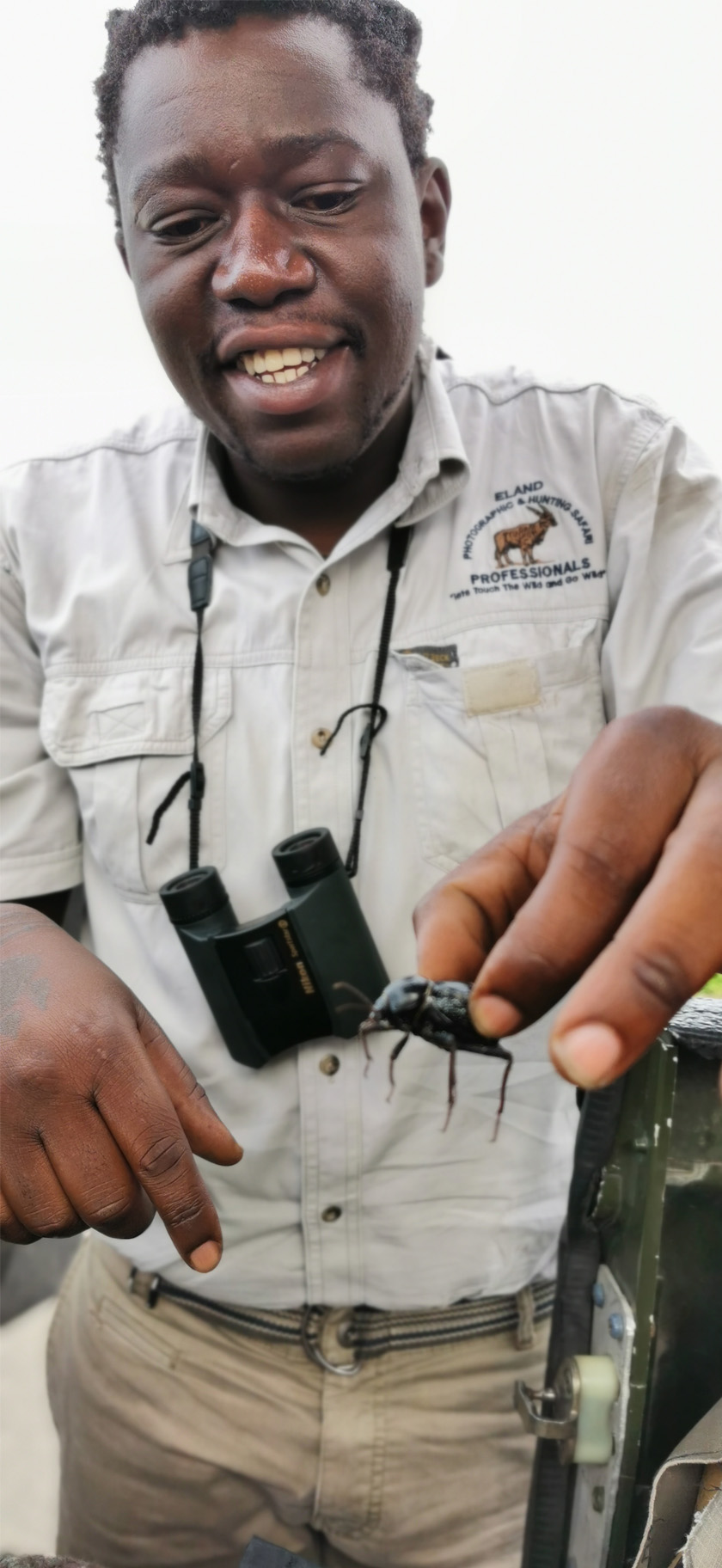 I had asked to see cheetahs and rhinos if possible, but unlike my experience in Tanzania the safari in Hwange was a total shot in the dark. By comparison, the tracks were almost empty and, as Roderick mentioned, tourism had taken a big hit over the last few years. The watering holes for the animals had mostly dried up and now had to be sustained by solar-powered pumps that had been set up thanks to the generosity of several conservational and charitable foundations. On the outskirts of each watering hole was a veritable graveyard of dead baby elephants who had been unable to make the journey and get the water they so desperately needed. Whereas in Serengeti a dead animal would be picked apart in mere minutes, in Hwange the animal population was sparse enough that, even weeks after passing, the dead elephants had meat still rotting on their carcasses. We did see some elephants who were old enough and strong enough to make it to the watering holes, as well as some breeding herds. There were the usual herds of antelope and zebra and some giraffes as well. It was also in Hwange that I was introduced to one of my new favourite insect species, the dung beetle.
I had asked to see cheetahs and rhinos if possible, but unlike my experience in Tanzania the safari in Hwange was a total shot in the dark. By comparison, the tracks were almost empty and, as Roderick mentioned, tourism had taken a big hit over the last few years. The watering holes for the animals had mostly dried up and now had to be sustained by solar-powered pumps that had been set up thanks to the generosity of several conservational and charitable foundations. On the outskirts of each watering hole was a veritable graveyard of dead baby elephants who had been unable to make the journey and get the water they so desperately needed. Whereas in Serengeti a dead animal would be picked apart in mere minutes, in Hwange the animal population was sparse enough that, even weeks after passing, the dead elephants had meat still rotting on their carcasses. We did see some elephants who were old enough and strong enough to make it to the watering holes, as well as some breeding herds. There were the usual herds of antelope and zebra and some giraffes as well. It was also in Hwange that I was introduced to one of my new favourite insect species, the dung beetle.
When we sat and had lunch I mentioned to Roderick that although we hadn’t been able to see as many animals as I would have hoped we had still gotten very lucky with the weather. It was now mid-December and there had not been a drop of rain that day. The flooding rains that feed the crops in this part of Africa were a full six weeks behind schedule. After lunch we headed out back down the tracks that wind their way through the park and as we were driving to one watering hole Roderick had a concerned look on his face and suggested we pull out our ponchos. It was grey ahead, but it didn’t seem too threatening. A few light drops fell as we pulled up to the watering hole. There were no animals in sight so we turned around.
Oh shit! Roderick cried out as he hit the gas.
Suddenly, the skies opened pouring the rain down in heaps. Because the old land cruiser we were in had no windshield, as Roderick was speeding down the track toward the main road the rain just flew into our faces. I put my hand up in front of my face leaving only a small space in between my fingers to look through, but the rain was falling so hard and so fast that I could barely see. Within a few seconds, I was sitting in a pool of water that went halfway up my waist. I was concerned about my phone getting flooded and no longer working and as Roderick drove I held onto the side of the car and struggled to open a plastic Ziploc baggie to store my phone before it got drenched. The rain was so thick and whipping into my eyes, but every so often I had to get up and push the tarp that covered the car to let the rain that had gathered on top spill out. Within seconds, the track disappeared and we were driving through a flooded jungle with the water level halfway up the tires. The speeding land cruiser created waves of mud that flew up on either side. Though we were wearing ponchos, they were useless against this kind of onslaught and within minutes every inch of us was drenched. By the time we reached the main road the rain which had been relentlessly pelting us for the last half hour began to subside. I was in shock at how everything had seemed to turn on a dime. A dry savanna on a pleasant day full of sunshine had been turned into a marsh in a matter of seconds leaving Roderick to simply shrug his shoulders and reiterate a phrase I had already heard so many times: This is Africa.
Our heartbeats began to slow to a normal repeating rhythm and we stopped the land cruiser to take a moment to review what had just happened. Roderick wiped the water from his face and looked at me with a stunned look that accentuated his wide grin and exposed his pure white teeth. He laughed uproariously.
When we eventually returned to the lodge I was greeted by Ndaba who came by to update me on the next day’s schedule. He saw me soaked to the bone and asked what had happened. After I told him the story he said: Hey brother, this is Africa. Still wet, I sat and bought a beer to test out whether my credit card was still working and it turned out that all that anxiety accumulated over the course of the day was for nothing. Ndaba and the manager of the lodge kept saying that credit card machines work or don’t work based on their ability to connect to the network. This was a problem that would persist throughout my entire visit to Zimbabwe. While he had been in town, Ndaba remarked that he had seen the train pass a few hours earlier. Travelling from Victoria Falls to Harare by train had been my original travel plan for Zimbabwe before negotiating with Simba and Ndaba. It had left at relatively the same time as us the previous day which meant that it covered the 180 or so kilometres in just over 24 hours. I was already feeling justified in my decision.
We were out the door early the next morning headed to Bulawayo. I was interested in Bulawayo because it was a major city that tourists did not usually visit and I was curious to see African life off of the tourist trail. At the doorstep of Matobo National Park where rhinos were protected, and being a major city, I figured Bulawayo would be a good hub to stock up before we visited the park and then headed east to Masvingo. Bulawayo was also Ndaba’s home town and he appreciated my desire to explore because it would give him a chance to visit his old family house and help his brother transport a damaged gearbox to a local mechanic.
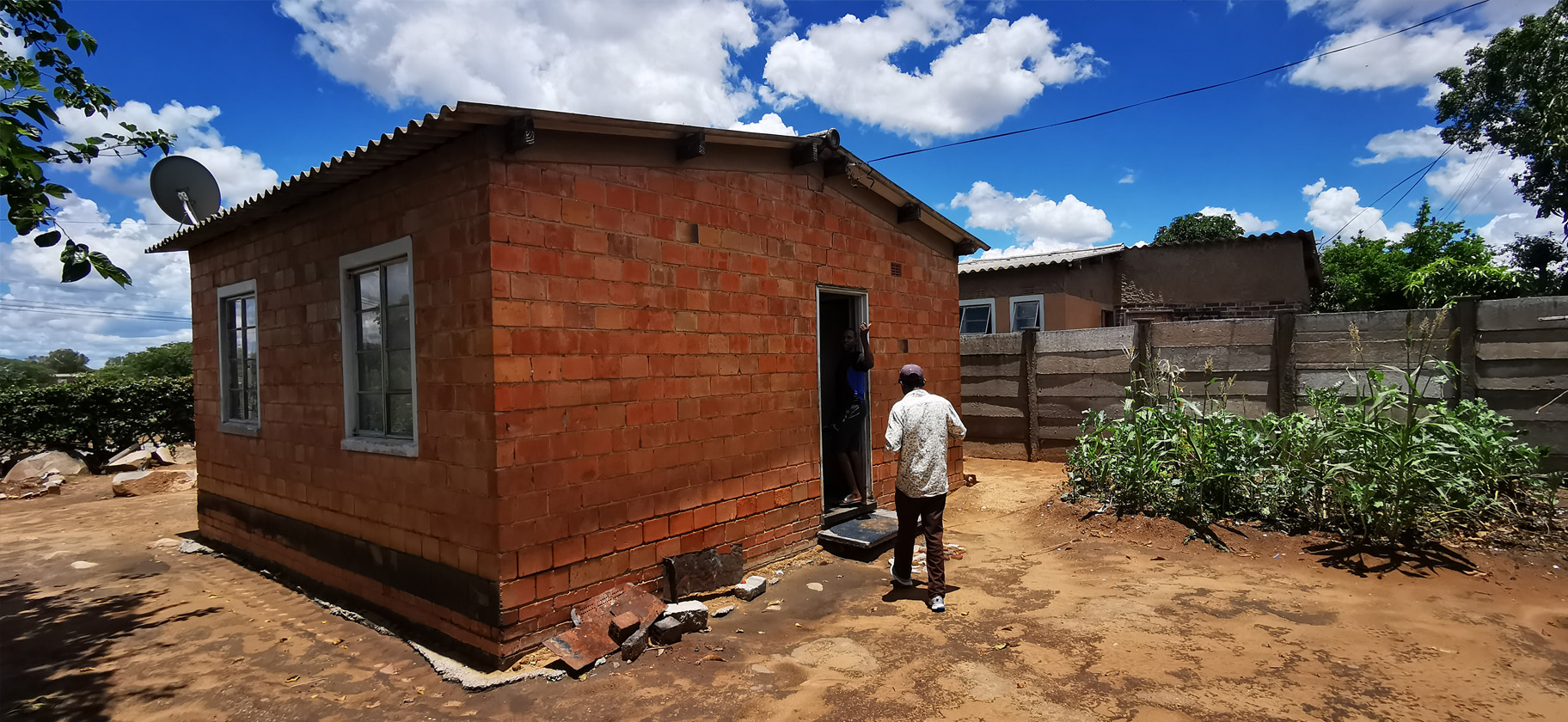
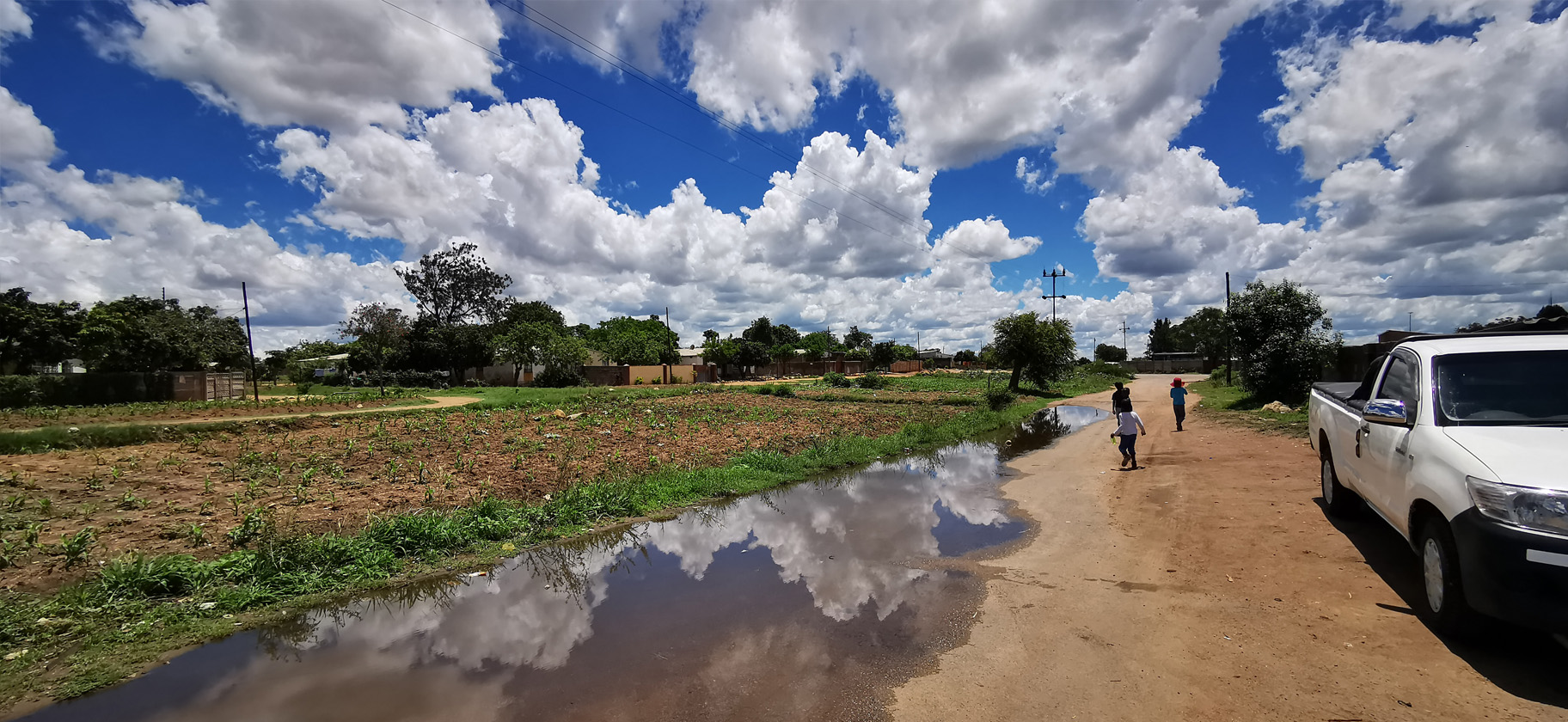
It was midday when we arrived at the outskirts of Bulawayo city in a small dusty township where Ndaba’s family house was located. It was a tiny freestanding square box of bricks that could not have been much larger than my apartment in Vancouver. There were no decorations or signs of the common western comforts of home and his brother’s situation in that house was purely a day-to-day affair making things work as best as he could. Local children walked through the neighbourhood waving and looking stunned to see someone like me.
After dropping off Ndaba’s brother and the gearbox at the mechanic we headed in towards town to look for a lodge. At one point, Ndaba pointed toward a gas station and said with certainty: They have gas!
How can you tell? I asked.
There’s a lineup. And it doesn’t look too long. Brother, I think we should stop and get some gas.
We pulled off the road and only had to wait about 15 minutes before we were able to fill up. An attendant came over to speak to Ndaba about putting his information onto a signup sheet so that he could be part of a Whatsapp group chat that could inform him of whenever the gas station had gasoline available. When it came time to pay, I asked if I could pay with my credit card which they said was impossible, again blaming the network. I was responsible for the gasoline, but at this moment all I could do was look at Ndaba and ask him to find a solution with the promise that I would be able to pay him at the far end, assuming I could use my credit card with whatever machine he would end up having to put the transaction through. He pulled out his EcoCash card, which was how most Zimbabweans paid for just about everything, and paid for the gas. How EcoCash worked versus cash or regular credit cards was anybody’s guess, but it was how they got things done in Zimbabwe – that or the black market.
Finding a lodge in Bulawayo was tricky. Ndaba was sensing by now that I had a certain standard of comfort and cleanliness that I was looking for. After the crotch itch debacle back in Lusaka I was willing to pay extra to sleep soundly, comfortably, and cleanly, but every time there was a hitch in the plans. We found a lodge that I found suitable and affordable, but when it came to paying them, the only way was with cash. But I had no cash, nor did I have any way to get cash. There was also the problem of there always being two prices. Ndaba did all the negotiating on my behalf and there would always be a new price when I entered the room and they saw my white face. The argument was always that I was not a tourist but was Ndaba’s friend. It was enough to get me a discount, but often, for the quality of the accommodation it seemed outrageous that it should be so expensive. Eventually, we tried our luck at one of the more expensive hotels in the area where I was assured everything would work, but being as expensive as it was I told Ndaba that he would need to find his own accommodation because I simply could not afford to pay for two rooms at the price I was quoted. Ndaba reassured me that it was not a problem but urged me to take the room or risk losing the whole day to the search.
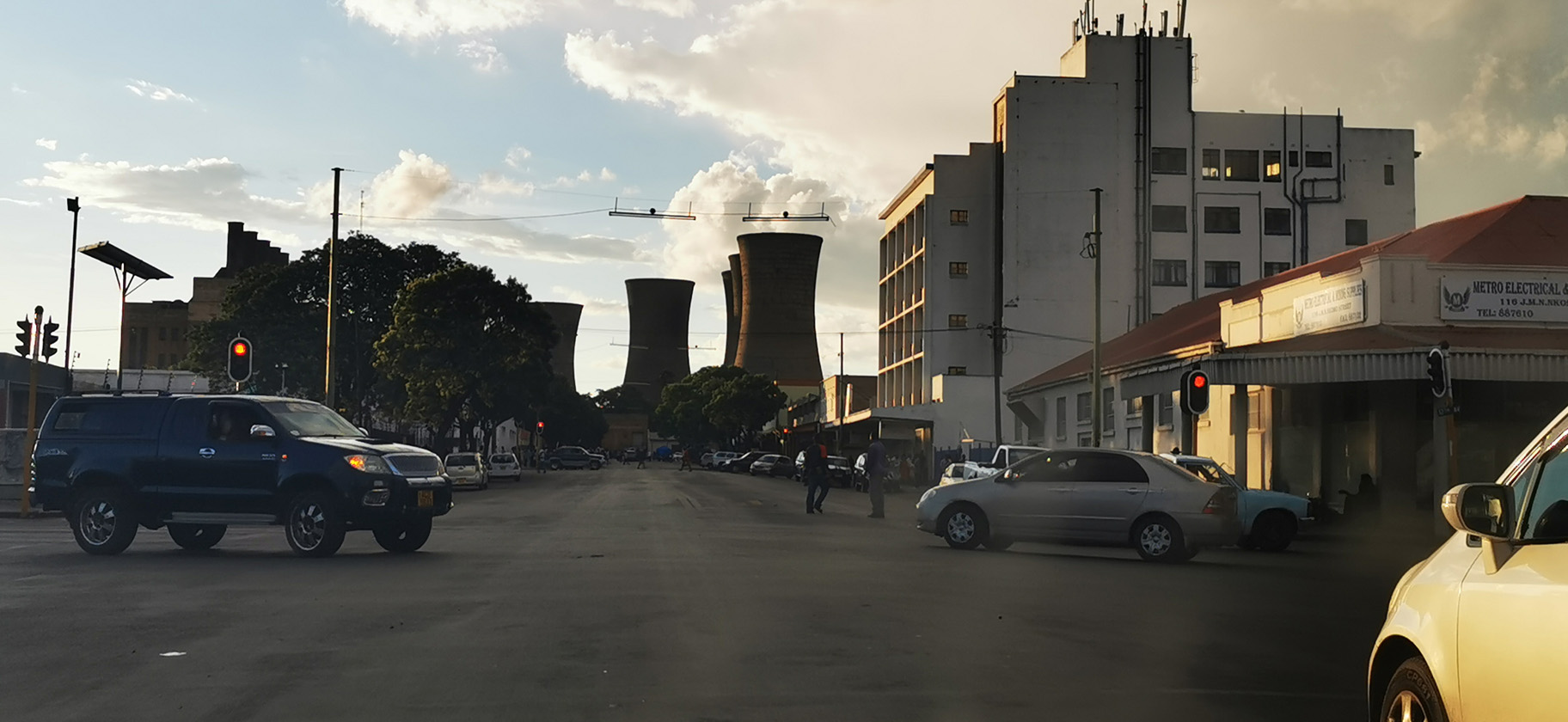
By the early evening, Ndaba came to pick me up to take me into the city so that I could get a small glimpse of daily life in Bulawayo. Driving along the main road, the smokestacks from the ZESA power station tower over the city and dominate the landscape. It is the kind of relic from the atomic era that conjures images of the Chernobyl nuclear disaster, and that citizens in countries that straddle the North Atlantic would never allow in their cities but, in Bulawayo, it was the easiest way to orient yourself. Ndaba brought me to where he was staying. It was run down and beat up, chaotic, and had few vacancies. The seat for the toilet was missing and mould was growing on the ceiling. The walls were bare and the paint peeling, the linens on the bed were in tatters, and at $20 for the night it seemed expensive for what it offered. Ndaba had helped himself to a pizza and offered me as much as I wanted, but I brushed him off saying that I would get a whole pizza for myself in the city. My heart sank when I thought about the hotel where I was staying and he left to spend his evening in comparative squalor.
We took a stroll through the crowded central market and around some of the government buildings. Downtown Bulawayo is a functional and not too scenic sort of place and though I was the only white man around for miles, with no tourism to speak of, Ndaba and I were invisible. The sun began to set and though there were street lamps there was no electricity to light them up. A few shops, franchises mostly, had generators to keep their lights on but for the most part the city was becoming dark. Ndaba and I focused on getting me that pizza and stopped in at Chicken Inn, a franchise you can find in just about any town in Zimbabwe. I placed my order but when it came time to pay, my credit card would not work. We stopped in at the Pick n’ Pay hoping I could pick up some sundries like dry snacks and some bananas, but they couldn’t accept an international card. Bulawayo effectively paralyzed me as a traveller. I wondered whether the hotel at which I was staying may have been the only place even able to effectively perform a transaction with my credit card. I had to ask Ndaba about getting cash at an ATM. Do you see a lineup at any of the ATMs, brother? he asked rhetorically.
With all the light now gone the city seemed haunted. As an outsider I couldn’t participate in the economy. We drove through the city which was now overcrowded with thousands of people waiting in the streets and slowing traffic.
What are all of these people doing just standing in the street? I asked Ndaba.
They are waiting for the bus, he said. It’s the end of the workday and they are going home.
The scene took my breath away. Under the fading glow of a few shops with electricity, a line of people extended for kilometres all waiting for a single bus. I imagined what it would be like outside of a stadium in America after a sporting event during a blackout and in a city without the infrastructure to get people back to where they lived. Carnage would ensue and it would be national news. In Bulawayo this was just your typical weekday. More disturbing than the expanse of that lineup was the look of calm resignation on the faces of everyone in it. Where I come from, even a single delay on the subway can bring out the rage and vitriol of the whole city but, in Bulawayo, the wait was an understood and expected part of life.
Before leaving Bulawayo, the hotel let me pack up food from the buffet and I took a lot of liberties by stuffing away enough food for two so that I could be sure Ndaba could eat just as well as me. After exploring Matobo National Park, Ndaba and I headed out on the road to Masvingo. Having travelled through the park we had already been on the road most of the day, but Masvingo was still another 350 kilometres away and it was during this ride that the character of Zimbabwe reached a whole other level.
From Victoria Falls to Bulawayo there had already been a number of police checkpoints, most of which involved nothing more than a few quick words between Ndaba and the police in the local language, maybe a handshake or a high five, and a smile. But heading back toward Bulawayo we came to a road barrier and were approached by three individuals in uniforms. Ndaba rolled down his window and greeted them with his customary, ‘Hey bruh’. They blurted some terse words in his direction without looking him in the eye. Until that moment, Ndaba had been one of the coolest customers I had ever met, especially in light of the fact that getting anything or anywhere in Zimbabwe isn’t easy. Whatever it was they said to him, or how they said it, it set him off. This was not your typical stop at a police checkpoint and I did not want any trouble so I just concentrated on pointing my gaze forward and trusted that this altercation would work itself out. During some previous checkpoints Ndaba had been asked to show his licenses and proof that he worked for a touring company. Although I could not make heads or tails of what was being said, in my mind I thought that that was all that they wanted to see from Ndaba but he was refusing to comply. This argument was going on for several minutes and the urge to intervene was growing inside me. I had to remind myself that this was not my world and that the answers to the problems here were not the same as where I come from and that you could not circumvent procedures with a cool head. Ndaba never did present any identification and eventually we were allowed to pass and drive on.
What the hell was all that about? I asked.
I don’t think that they are really policemen. Ndaba replied.
What?
She just came to me and didn’t say ‘hello’ or anything. She just asked to see my documents. That’s not how we do things here. If you don’t know how things work they’ll just stop you and try to take advantage of you. But I know how things work, so I had to tell her that. They’ll look for anything. They’ll find any excuse. And anything they find they’ll say you owe this much money, or this much money, whatever they can get out of you.
But you say you think that they weren’t even really police?
I don’t think so because the police, the real police, they know all these things that I know. These guys probably found the pylons in the garbage and got the uniforms at a costume shop in South Africa and figure that they can make some money this way. Sometimes the real police will look for any excuse too, and then you have to bribe them, but they do it with a smile. I don’t know what was wrong with that lady.
But wouldn’t the police then come and stop these people? I asked.
No brother, they’ll just pay the police not to stop them.
No gas at the gas stations; no cash in the ATMs; a dilapidated hotel for my guide to stay in; and no ability to buy a pizza in downtown Bulawayo. Like an optometrist shining a light into my retina, until then I had been distracted and staring forward into the distance, but along this road to Masvingo my irises were finally beginning to focus. And once you see it, once you stare straight into the light, it can not be unseen.
Every discrepancy in living standards between the world of Africa and the West can be seen along that highway between Bulawayo and Masvingo. For the most part, the road was in perfect condition – traditionally a sign of a country’s high living standards – but along the side of the road for 300 kilometres were signs of an underground economy that was both illegal and responsible for propping up the majority of the population from descending completely into anarchy. Young boys could be seen by the side of the road with plastic canisters of fuel for sale on the black market that had been purchased in Botswana or South Africa and smuggled into Zimbabwe. As Ndaba pointed out, it was boys like these along the side of the road that were often the most reliable source of fuel. In between the fuel-boys were the milkmaids – old women who would bring jugs of raw milk from their farm to the highway to sell. 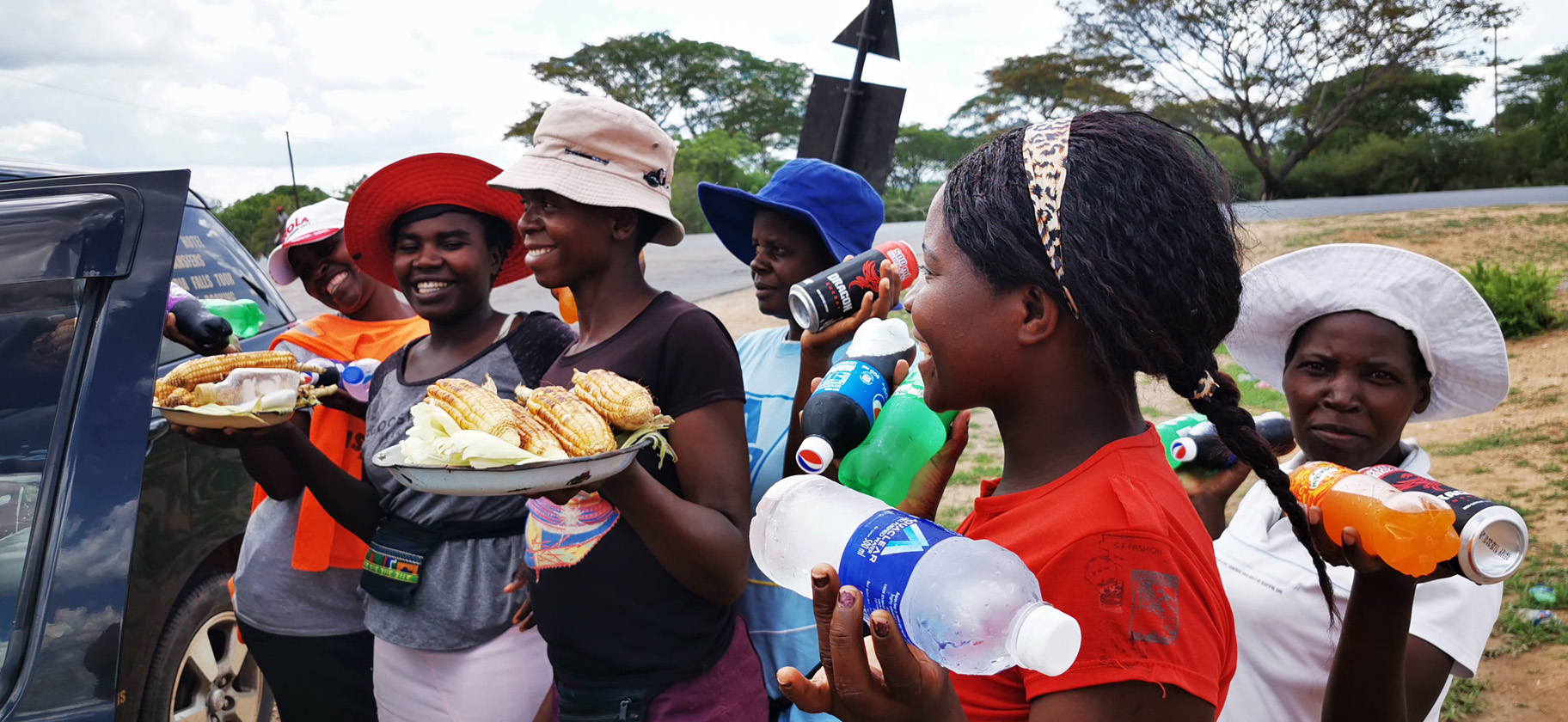 A little further down were groups of young women who would have a wood-burning barbecue going where they would be selling barbecued cobs of maize to anyone with cash and willing to stop. For three hundred kilometres the scenery was marked by abandoned orchards of old gum trees and fields of maize that were now used strictly for subsistence farming. Christmas was approaching and that was the time that people returned to their villages for the planting season. But, once upon a time, Zimbabwe was a major exporter of both gum and maize.
A little further down were groups of young women who would have a wood-burning barbecue going where they would be selling barbecued cobs of maize to anyone with cash and willing to stop. For three hundred kilometres the scenery was marked by abandoned orchards of old gum trees and fields of maize that were now used strictly for subsistence farming. Christmas was approaching and that was the time that people returned to their villages for the planting season. But, once upon a time, Zimbabwe was a major exporter of both gum and maize.
From the late 19th century until Zimbabwe’s Unilateral Declaration of Independence, Zimbabwe had done quite well for itself by African standards, profiting from British rule of law and infrastructure. The road system, built by former Prime Minister Ian Smith when Zimbabwe was still known as Rhodesia, was still in good condition though it was now a relic of a once rich history. To hear Ndaba tell it, the real problem with the land seizure that resulted from Mugabe’s reign was that it led to short-term profiteering by those who were able to sell off the technology and infrastructure that had previously benefitted the country. Things like tractors and backhoes and anything related to modern mechanized agriculture was quickly sold off for cash that lined the wallets of Mugabe and his circle of politicians, with some of it trickling down, and it eventually resulted in a backward economy. To quote Ndaba: For years, you could go to the grocery and we all had money but there was no food. Now, when you go to the grocery there is food, but nobody has any money. After seizing power in the early eighties, Mugabe was the head of state in Zimbabwe for 37 years. He died shortly after he resigned from his position in 2017 to avoid a coup, while his former vice-president rose to assume the presidency, but there is little trust between the new government and the people. Crippling sanctions from the West, according to Ndaba, have not had the effect that the Western powers might have hoped, leaving the targets of the sanctions largely untouched and the lion’s share of the burden falling on the people. Most recently, Zimbabwe has suffered from hyperinflation that rendered its currency useless – hence the souvenir money changers at the border. Zimbabwe has been trying to introduce its new Zimbabwean dollar with little success and the US dollar is still the most effective way to do business. Cash traders are a dime a dozen in every major city and taking advantage of major discrepancies in rates is a business all unto itself.
Traffic along the highway was light. Ndaba could point out what each car or truck headed in the opposite direction was likely doing on the road. There were two very common sightings. The first was the large buses with the word “Mimosa” painted on the side. The Mimosa buses were responsible for transporting workers from the scattered villages to the various Mimosa diamond and mineral mines which was one of the largest employers in the area. The mine produces platinum, palladium, rhodium and other precious metals. Diamonds From the Sky, is Mimosa’s diamond arm of the company and you can be sure that the workers responsible for sourcing the diamonds in the jewelry you might buy on Fifth Avenue in New York City don’t see a proportional share of the profits earned from their labour. We did not visit but to hear Ndaba describe the working conditions one can assume it is as bad as you could imagine.
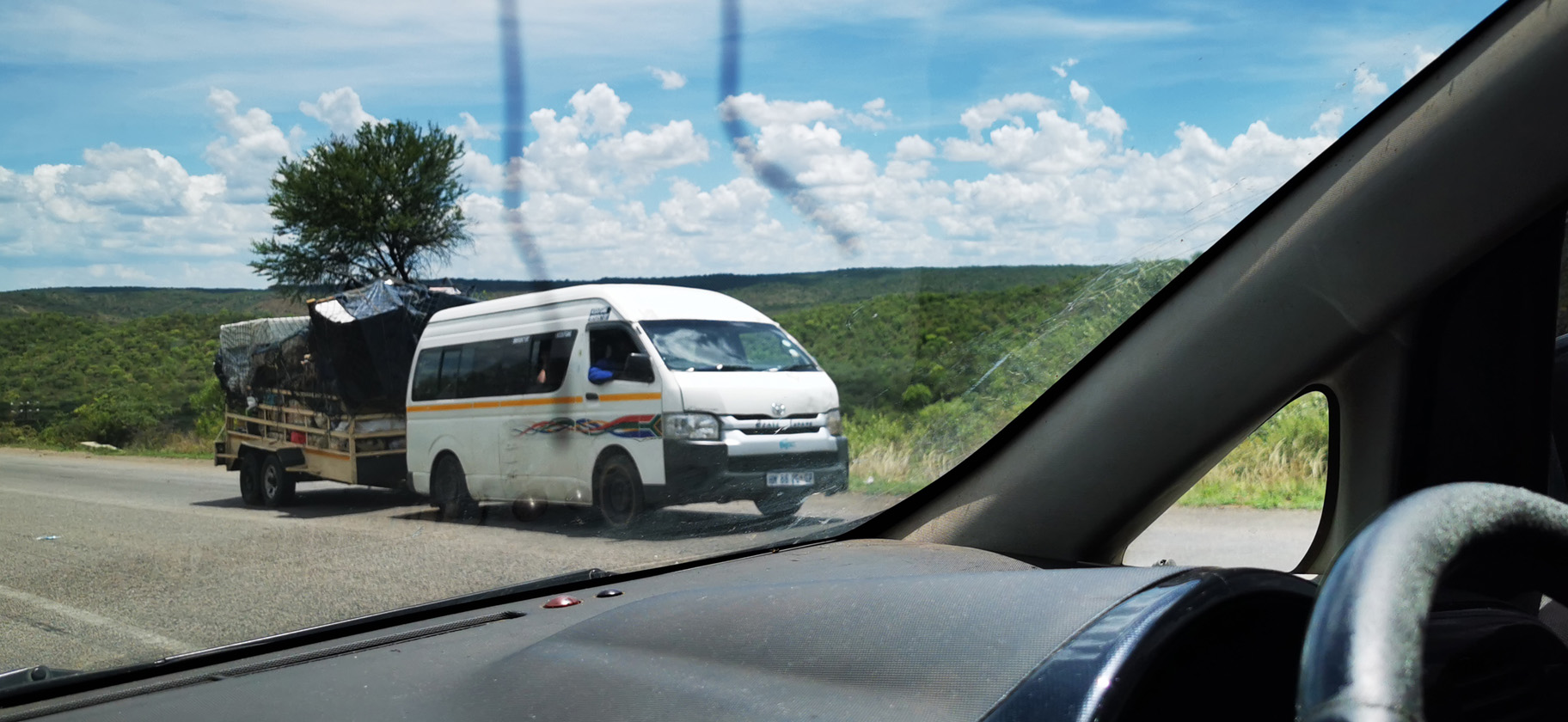 Pickup trucks carrying huge loads covered over by tarpaulin were the second most common sight. These were trucks carrying all sorts of things purchased in South Africa. Zimbabweans travel to South Africa to find work where they can earn money for themselves and their families. They also buy all sorts of consumer goods including TVs and other electronics, clothes, and furniture, and then sell it marked up in Zimbabwe. It was an endeavour that could take more than two years to complete, but, as Ndaba pointed out, at the end of it you could make real money. The tricky part was the fact that it was illegal and there were always police checks along the way that would require a one-hundred-dollar payout each time. It was risky, but in their economy the payoff was worth the risk.
Pickup trucks carrying huge loads covered over by tarpaulin were the second most common sight. These were trucks carrying all sorts of things purchased in South Africa. Zimbabweans travel to South Africa to find work where they can earn money for themselves and their families. They also buy all sorts of consumer goods including TVs and other electronics, clothes, and furniture, and then sell it marked up in Zimbabwe. It was an endeavour that could take more than two years to complete, but, as Ndaba pointed out, at the end of it you could make real money. The tricky part was the fact that it was illegal and there were always police checks along the way that would require a one-hundred-dollar payout each time. It was risky, but in their economy the payoff was worth the risk.
Visiting the Great Zimbabwe presented another sobering reality. Founded in the 11th century, the Great Zimbabwe is located some 15 kilometres south of Masvingo. It is believed to have served as the royal palace of local monarchs and was a major trading centre, mostly of cattle, until it was abandoned sometime during the 15th century. It is so important to the country, that it is where the country gets its name – the term ‘Zimbabwe’ coming from the Shona, translated approximately as “stone houses”. It is a site that blows open the myth that, before contact with Europeans, the African continent was inhabited exclusively by small tribal bands lacking a centralized government. Imagine modern-day Egypt being called Pyramidia, or present-day Peru bearing, instead, the name Machu Picchu and you begin to get an idea of the level of its importance to the nation. Still, when signing in at the entrance to visit, our names were the only ones inscribed in the ledger for days. It was an experience I had not had in years. Here I was at a site of major historical importance and there was no lineup to enter; there were no hawkers and no commerce of any kind selling kitsch in the parking lot; no velvet ropes; no tour groups being led by a guide holding a flag in the air nor the cackle of their commentary blasting over a megaphone. There was nothing but Ndaba and I with the freedom to explore the ruins at the top of the mountain, feel the wind on our faces, and stand on the once hallowed ground of Zimbabwean kings. Tourism in Zimbabwe, outside of Victoria Falls which Ndaba often described as a country within a country, was drying up.
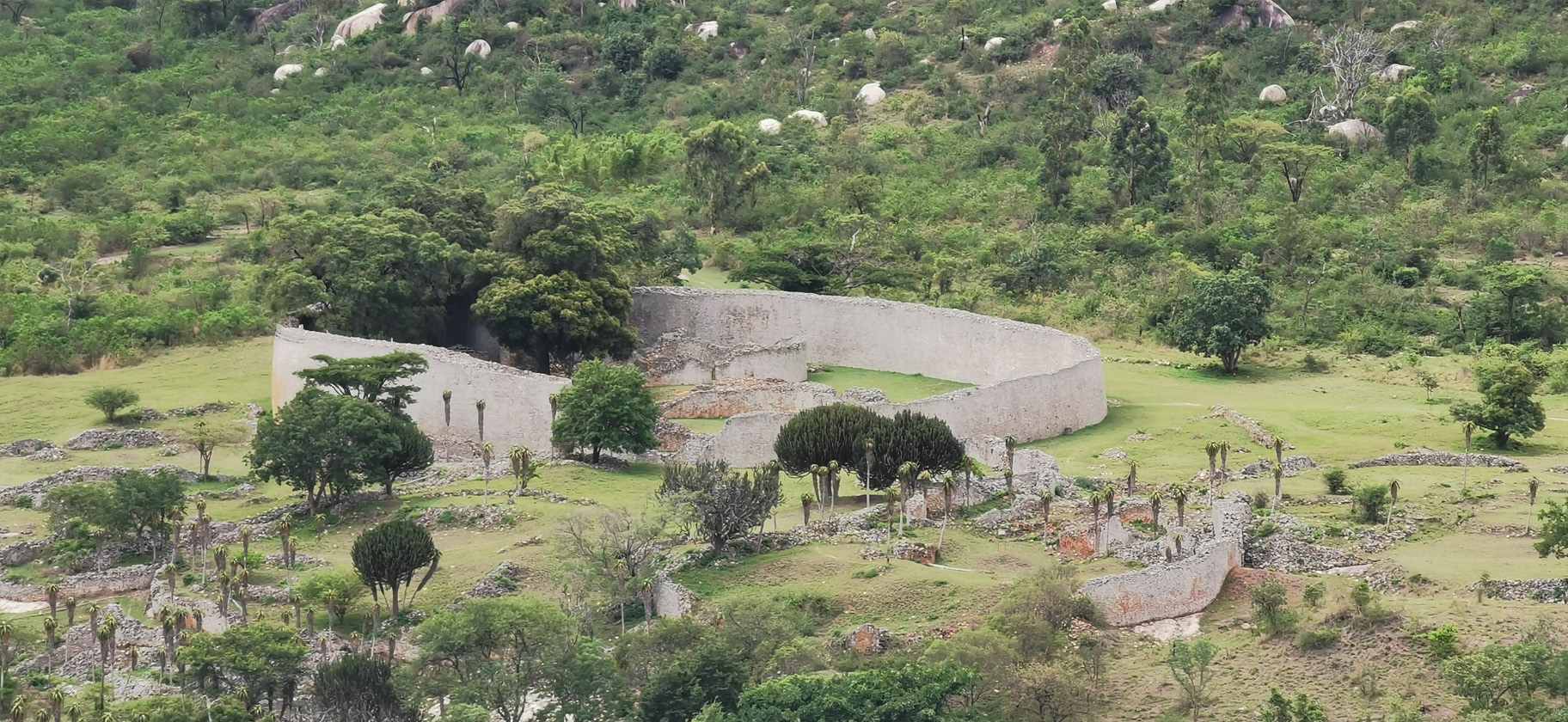
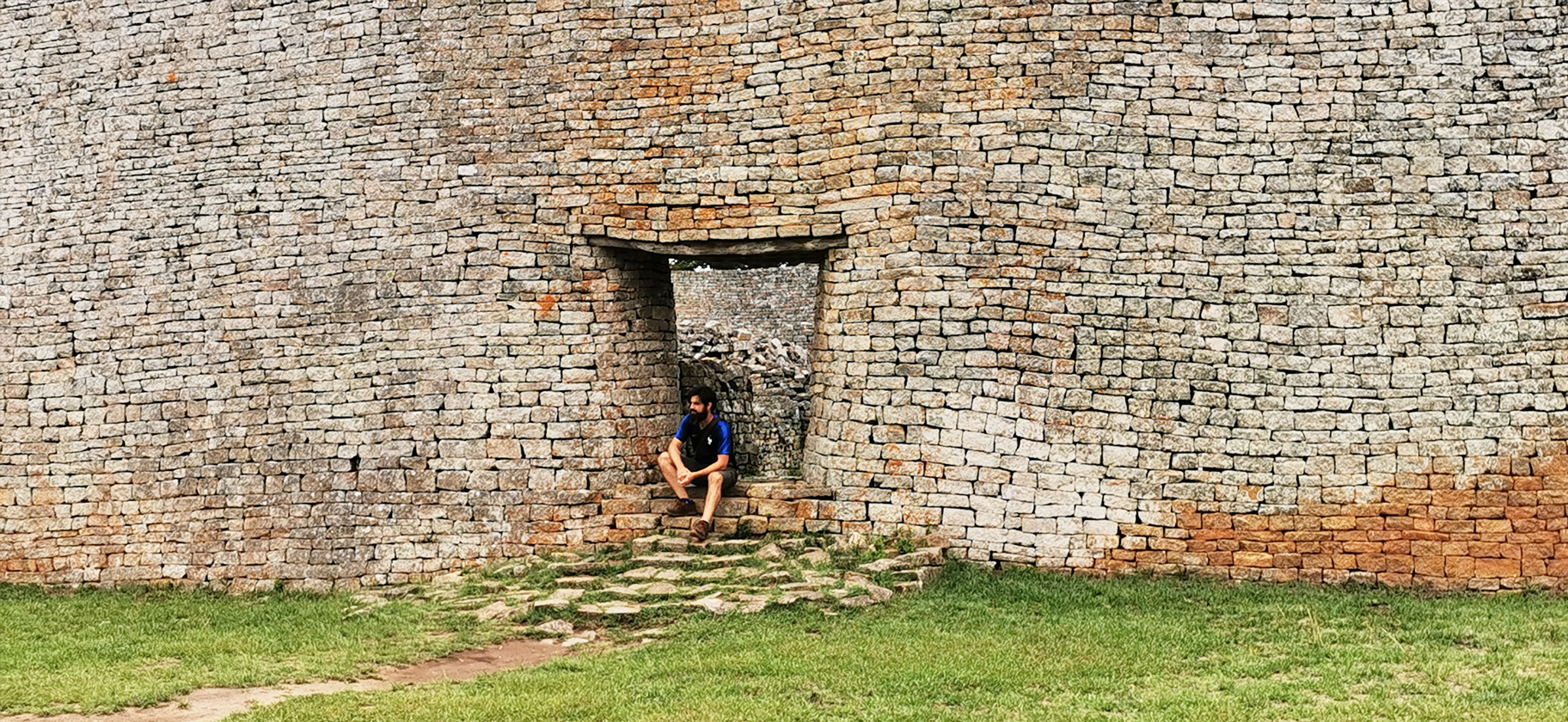
Hoping to avoid having to stay in separate accommodations of disparate living standards as we had had to do in Bulawayo, I was able to find an Airbnb run by a white Zimbabwean family in the suburbs of Masvingo. Ndaba and I had an affordable two-bedroom guest house on a property that had dogs, cats, and even tortoises roaming around to play with. Gasoline, which was always a concern, came up again as we were planning the last leg of our journey to Harare.
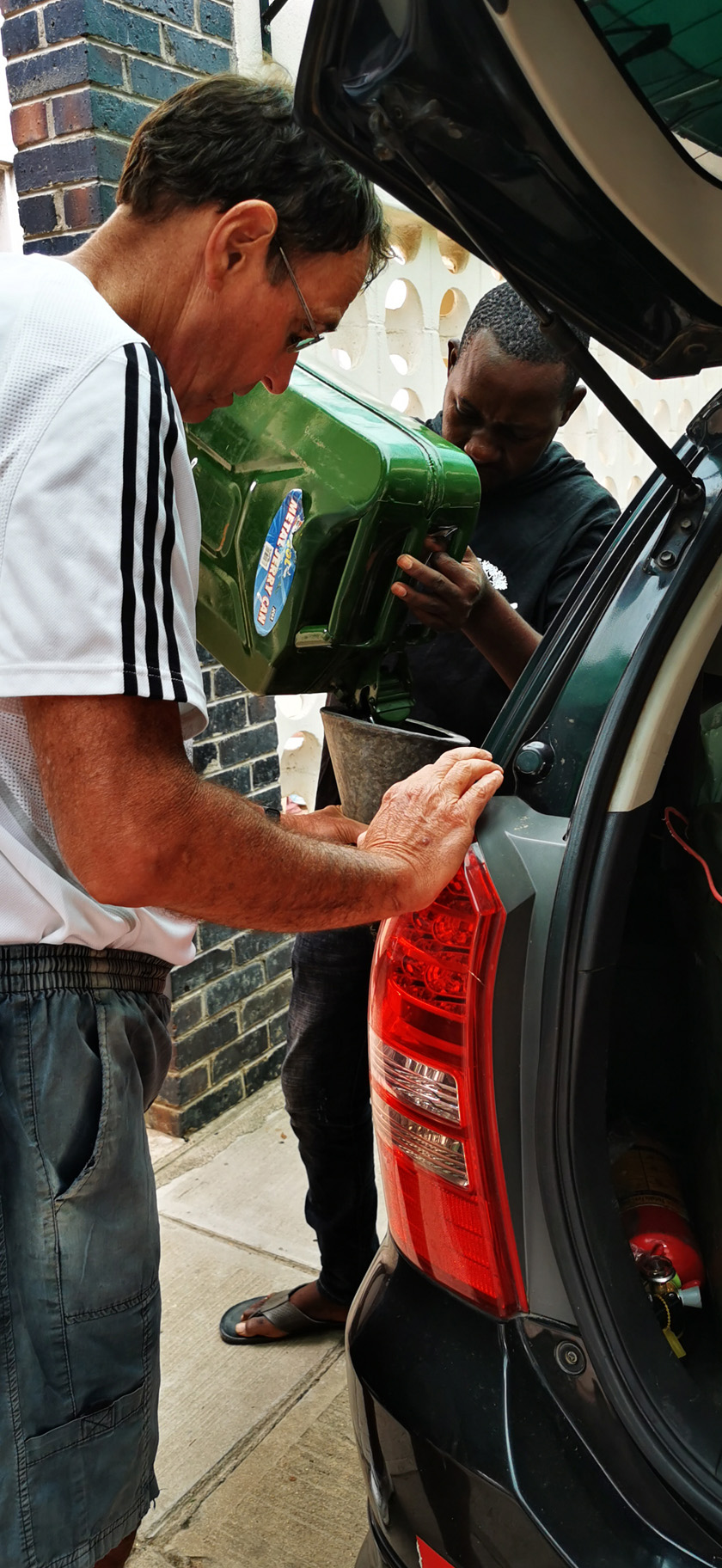 Until a few years ago, our hosts had run a gas station in town. Then, one day, they were offered a suitcase of cash to have it taken off their hands. They used all that cash to play in the cash exchanges and had done okay for themselves. Having run the gas station in town they now had many contacts which meant that we would be able to skip the queue. But then the bigger question came up: how do we pay for it? For all of the challenges they are faced with, Zimbabweans have become experts at devising ingenious ways to skirt around the barriers in front of them and come up with solutions to keep trade flowing. Because of the constant fuel shortage problem, and because of their contacts at the various gas stations in town, it meant that our hosts had several jerry cans of reserve fuel just sitting around in their home. They were happy to fill our tanks for us, they could then just refill the jerry cans at their leisure whenever the station alerted them that they had fuel, and we could use Airbnb’s “send or request money” feature to pay for the gasoline.
Until a few years ago, our hosts had run a gas station in town. Then, one day, they were offered a suitcase of cash to have it taken off their hands. They used all that cash to play in the cash exchanges and had done okay for themselves. Having run the gas station in town they now had many contacts which meant that we would be able to skip the queue. But then the bigger question came up: how do we pay for it? For all of the challenges they are faced with, Zimbabweans have become experts at devising ingenious ways to skirt around the barriers in front of them and come up with solutions to keep trade flowing. Because of the constant fuel shortage problem, and because of their contacts at the various gas stations in town, it meant that our hosts had several jerry cans of reserve fuel just sitting around in their home. They were happy to fill our tanks for us, they could then just refill the jerry cans at their leisure whenever the station alerted them that they had fuel, and we could use Airbnb’s “send or request money” feature to pay for the gasoline.
In the week that Ndaba and I spent together we got to know each other quite well and by the end of the journey it was no longer so much a relationship between tourist and guide, but a partnership of two people experiencing the journey from Victoria Falls to Harare together. Ndaba supplied the car and the know-how and I supplied the reasons and the resources, but it was our collective ingenuity that made it morph into the cooperative experience that it was. With not much else to do while spending so many hours crossing the country by car, we talked a lot about our lives. Though our experiences growing up had been very different we were still able to uncover a shared sense of the struggle of becoming men in our modern world. I remarked how today I was living a life that years earlier, in my late twenties and early thirties, I could scarcely have dreamed was possible. I spent many nights back then frustrated at not being able to enjoy my life the way I wanted, and not being able to travel because of underemployment and simply not being able to afford to pay my bills or make my way through life. Ndaba, similarly, told me about reaching his late teens and having no work and nothing to do. He decided to volunteer his time to the Old Madala, a man who owned some fields but was too old to work them. Ndaba planted some crops of maize and sold it off giving half of the proceeds to the Old Madala and keeping the other half for himself. With the money, he was able to buy his license which is what allowed him to do the kind of touring work he had been doing for the last 10 years as well as start a family. He still had hopes of one day getting a license to drive large trucks and buses, but to do so was a matter of saving up enough money which in Zimbabwe is not easy. Most recently, he had developed an interest in T-shirts but finding the capital and other resources to get a business like that off the ground felt like a pipe dream.
Before arriving in Southern Africa, the only lingering effects of the centuries of colonialism that I had ever witnessed had been the present-day net positives of cultural mixing that make the cities of a place like Canada a little more colourful. Growing up in Montreal where there are thriving French-speaking North African and Caribbean communities and the hardship that people from these regions endured at the hands of European exploitation was the sort of thing you really only learned about in classrooms or read about in books. Even while on safari in Serengeti, walking the beach in Zanzibar, or window shopping at the mall in Lusaka, the plight of countless millions over generations who had had the freedom to control their own destinies wrested from their grip from the moment they were born, still seemed a far off concept that I simply had to accept. But, somewhere between Livingstone and Harare, everything I had learned about from history books became real and the mythology of parts of Africa as an unspoilt paradise was burned to cinders. The truth of the matter was clear that the centuries of European exploitation of the continent for its natural resources that took place from the 15th century onward was matched in kind today through worldwide apathy and neglect. Today, Africa is the poster child for first world to third world thinking used to conjure an empty sense of sympathy when it is convenient – “there are children starving in Africa, so eat up all of your vegetables”. The truth is, Africa is an afterthought in the modern global economy so no one really cares what happens over there because it doesn’t affect what’s really important over here. The worst humiliation is that today’s richest economies were built on the backs of the Continent’s most valuable resource – its people – for which it has never been adequately compensated. With traditional notions of slavery a thing of the past, Africa today is treated as a vast and empty ocean whose waters are too turbulent to set sail in. No longer able to exploit that one precious resource, the world now seems to be repeating the words of the Portuguese king spoken to the once-great king of the Kongo, Nzinga Mbemba, 500 years ago. When Nzinga Mbemba complained that the Portuguese were taking too many slaves, thereby robbing Kongo of its labour force, he was told by the king of Portugal that Kongo had nothing else to sell.
It would be easy to sell all of Africa short by using my impressions gleaned over a week in Zimbabwe to paint the entire continent with so broad a brush, but this is the true reward of travel – that it can open our eyes to the preconceptions we once held and realign our thinking. It is difficult to pinpoint the exact moment when it happened, because I had gone to Africa with the understanding that it would be a challenging place to travel but, somewhere along the way, my heart began to swell with sadness in the belief that the people here were being confronted with real injustice.
Ndaba complained often about the corruption within the Zimbabwean government and how it failed to provide for the people. It was a case of the people in power taking for themselves at the expense of those they are tasked with protecting. As a result, Zimbabweans had had to develop ways both to assist and cheat each other just to survive. Meanwhile, recent news from Vancouver was that the city had spent somewhere in the vicinity of $4 million to hang an ostentatious chandelier on the underside of a bridge in an obscure corner of the city near where I had been living the last seven years. Ndaba guffawed when I told him this bit of news, but it drove the point home even clearer when I explained that where I come from we could afford to waste money in such ways. Problems where I come, I explained, are not real problems.
Vancouver, though consistently toward the top of many lists and polls as one of the World’s best places to live, is not without its own problems. The homeless situation and widespread drug use have been well-publicized challenges that have been going on for decades and one that is tolerated with a smile by residents in light of all the other benefits that come with living in Vancouver. Housing is some of the most expensive in the world meaning that some people are spending more than 50% of their salary on their homes and where, with housing prices constantly on the rise, a person’s home effectively generates more income than they do at their job. Talk of the housing bubble bursting has been going on for decades. Though not without its faults and loopholes rife with opportunities for exploitation and failure, in Canada there is a sense that there is an impartial and pervasive bureaucracy that can assist even the most at-risk in the very bleakest of circumstances. And though the suffering and frustration during my own struggles at certain points in my life were formative and seemed real, they paled in comparison to what I saw so many coping with and having been granted one-tenth of the advantages I had, just by virtue of where they were born.
By now, Dar es Salaam seemed far away and three weeks a lifetime ago. I had covered close to 4,000 kilometres on my journey and learned that Africa was more than just safaris and Zanzibar beaches. The people that had come into my life in that time were few but the impact that they made was profound. In Serengeti and Ngorogoro I must have taken hundreds of photos of lions and elephants and giraffes, and now I feared I had taken too few of those who took the time to take an interest in what I was doing strolling through their little corner of the world. But I have to trust that the memories that I photographed with my heart will endure. Whether it is Patrick’s bashful eyes in both offering and accepting help, Gloria’s tireless efforts to keep me cozy and earn an invitation to Canada, Debra’s smile and ability to snap off a beer cap with her teeth, Ndaba’s ability to keep cool in any situation, or even the little lady who just wanted to make sure I managed to find the right lineup of people to get on that train in Dar es Salaam, all of them saved me in some way. Years from now they may remain immortalized in a photo, but it is their contribution to the story, my story, however small, that is of paramount significance – and no camera can ever capture that. Elephants and Zebras, big skies, and sandy beaches may inspire awe, but it is the people we meet along the way who inspire hope and who can change our minds, and there is no brochure for that. They are why stories are written and they are what remind me every day that there is kindness everywhere.
Before I left Africa, I couldn’t help but make one final observation to Ndaba. Though the prevailing sentiment from everyone that I met in Zimbabwe was that the government was corrupt and that it robbed and exploited its people, there was absolutely no sense of outrage. I was only 10 years old but I can still remember images on the TV when the Berlin wall came down. As a teenager, I skipped school to attend the ‘No’ Rally in downtown Montreal which helped the province of Quebec remain a part of Canada. In my twenties, there were anti-war rallies after the US invasion of Iraq. When the Quebec government raised college and university tuitions, students took to the streets with their pots and pans. During the great recession of 2008, demonstrators descended upon Wall Street to demand that someone be held accountable for the failure of its financial institutions. After innumerable mass shootings in the US, millions consistently gather to protest gun violence. Marches and rallies to protest the fossil fuel industry seem to be a regular occurrence and the movement of Les Gilets Jaunes has been ongoing since 2018. Even if nothing ever seems to get done, the spirit of peaceful protest to demand more from their government is ingrained in the European and American psyche. But in Zimbabwe, where it already seemed that so much had been stolen from its people, even to protest was something one could only whisper about in small numbers and in dark corners.
How is it, I asked Ndaba, that with all of the problems that Zimbabweans face every day that they have not organized to protest? Is it not possible to stand together and rise up and demand more from the government?
No, Ndaba responded coldly, it’s not possible.
For some time, it seemed as though the issue was going to be dropped altogether as we sat in silence with our eyes forward on the highway before us and the steady hum of the tires on the asphalt beginning to lull us into hypnosis. But, instead of dissipating, it dangled uncomfortably unresolved until I scratched at the implacable itch on the roof of my mouth and asked why. Before the word left my lips I knew that I had broken a long-standing rule of mine which was to never ask a question to which I may not be able to accept the answer. Ndaba’s response drained all the blood from my face and sent chills up my spine. It remains the cruellest reality about the disparate nature of our respective worlds and a chilling reminder that the extent of your wealth or suffering is reducible to where you were born.
You don’t understand, brother, he said, We don’t have rubber bullets here.
